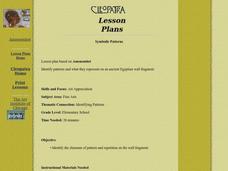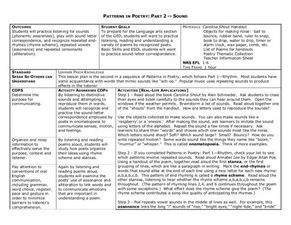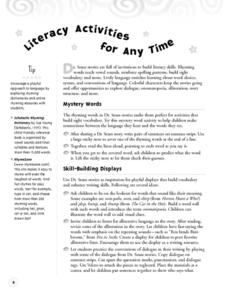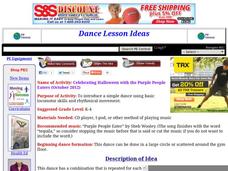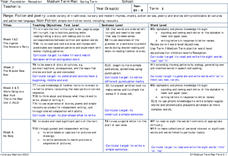Curated OER
Symbolic Patterns
Students identify patterns and what they represent on an ancient Egyptian wall fragment. Artists often repeat shapes, lines, and forms to create patterns. Several examples of repetition and pattern appear in this wall fragment.
Curated OER
Letter Chains: Spelling Knowledge
Your class will love this spelling activity. Learners create words based on a particular pattern. It is a great way to have them practice spelling patterns and identifying rhyming words. This technique could be used with a variety of...
Dick Blick Art Materials
“Rhythm in Layers”
Young artists learn to build rhythm into a design by repeating colors, shapes, and patterns in a 3-D sculpture activity.
Curated OER
Patterns in Poetry: Part 2 -- Sound
Students understand a variety of poems listening for sound letter correspondence, rhyme scheme, assonance, and alliteration. In this language arts instructional activity, students practice listening and reading skills to complete...
Curated OER
Printing Border Patterns
Students design printing blocks with patterns cut with scissors and/or Speedball Linozip Cutters. They print colorful repeating, alternating or tessellating pattern designs of difficulty appropriate for their age level.
Curated OER
Symmetrical Design: Pennsylvania Barn Signs
Second graders explain and apply the visual arts elements and the design principle of symmetry and apply media, techniques, and processes. In addition, they describe how different materials, techniques, and processes cause different...
Alabama Learning Exchange
Musical Patterns
Young scholars explore the concept of patterning using musical instruments. In this music lesson, students identify several instruments and practice playing patterns with them. Young scholars identify the patterning in a musical piece.
Curated OER
Add It Up Alligators
Students strengthen shape and pattern recognition, fine-motor and perceptual skills, encouraging imagination, play and sense of self within a group
Curated OER
Bee a Good Reader
Being able to distinguish between the sounds for short vowel e and long vowel e is an important skill. Young readers are introduced to the /ee/ vowel pattern that makes the long vowel sound. They practice reading and identifying a...
Scholastic
Literacy Activities for Any Time
As the title suggests, this packet is loaded with activities that can be used at any time. The common element in all the exercises is that they are connected to books by Dr. Seuss.
Curated OER
Celebrating Halloween With the Purple People Eaters
Get youngsters moving by teaching them some basic dance moves. This dance can be done in a circle, a line, or scattered around the gym. There are four movement combinations that are taught to the song "Purple People Eater" by Sheb...
Houghton Mifflin Harcourt
Around Town: Neighborhood and Community: Extra Support Lessons (Theme 3)
Neighborhood and community is the theme of a unit comprised of extra support lessons. Following practice pages and a teach, blend, guided practice, practice/apply routine, the series of lessons provide additional reinforcement...
Have Fun Teaching
March ABC Order
Reinforce alphabetizing and spelling skills while getting into the St. Patrick's Day spirit with a festive word sort that challenges young scholars to place and write words in alphabetical order.
Curated OER
Weaving a Story
It's time to investigate patterns! First and second graders construct a paper weaving using a hundreds chart, then use the Ti-10 calculator to make patterns such as adding 3 each time. Learners remove multiples of three from the hundreds...
Oglebay Institute
Post-Impressionism: Pointillism
How can little dots in two colors make a third color? Experiment with pointillism and color mixing with a series of activities. After viewing paintings by Seurat and watching a teacher demonstration, pupils create samples of three...
Curated OER
How Many Feet Will We Meet?
Emerging speakers distinguish between the sounds for short vowel /e/ and long vowel /e/. They are introduced to the vowel patterns that comprise the long vowel sounds, with emphasis on /ee/. They practice reading and spelling a variety...
Curated OER
The Alphabet of Coins
Young scholars use letter/sound relationships of initial consonants to complete sentences that follow a given repeating pattern. These sentences be based on coin terms found on the U.S. Mint H.I.P. Pocket Change™ Web site.
Curated OER
Teddy Bear, Teddy Bear
Students identify and use patterns in oral and written language, as well as in sounds, physical movements, and concrete objects.
Curated OER
Fiction and Poetry
Students explore fictional text and poetry. They explore the story structures used in the types of texts and examine the language patterns used. Students practice tracking text in the correct manner.
Curated OER
African Drumming - Repetition of Patterns
Students are introduced to basic patterns used in African drumming. They listen to examples of drumming by Kundidzora Azim, participate in chants and repeat demonstrated rhythms as a class.
Curated OER
Sequencing
Second graders practice their ability to sequence different events. Using a story, they put the events of a chapter book into order by cutting the events out and pasting them on a separate piece of paper. As a class, they repeat a...
Curated OER
I Give You My Heart
Second graders create hearts using stencils, pastels, construction paper, and tracing and cutting techniques in this Art activity for the 2nd grade classroom. Emphasis is placed on the concept of repeating patterns. An ideal activity...
Curated OER
19th Century Chandelier
Young scholars discuss the lines, shapes, and patterns used to decorate a 19th century chandelier. In this visual arts instructional activity, students examine the lines and identify the patterns on the chandelier. Young scholars create...
